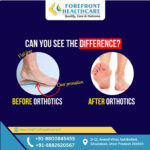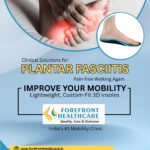
If you are searching best Bunions, Misaligned Toes, or Other Deformities clinic in Ghaziabad then visit forefront-healthcare.
- A bunion is a bony bump that forms on the joint at the base of the big toe (metatarsophalangeal or MTP joint).
- It occurs when the big toe shifts toward the smaller toes, pushing the joint outward.
- Inherited foot structure: Some people are genetically predisposed to developing bunions due to the shape and structure of their feet.
- Foot injuries: Past foot injuries can increase the risk of bunion formation.
- Rheumatoid arthritis: This condition, which causes inflammation and swelling in the joints, can contribute to bunions.
- Improper footwear: Shoes with narrow toe boxes, high heels, or those that squeeze the toes can worsen existing bunions or increase the risk of their development, according to the Mayo Clinic.
- Visible bump: A bulging bump on the outside of the base of the big toe is the most obvious sign.
- Pain and tenderness: You may experience pain, soreness, or tenderness around the big toe joint.
- Inflammation and redness: The skin over the bunion may appear red and inflamed.
- Difficulty walking or moving the toe: Limited movement or stiffness in the big toe can make walking painful.
- Corns and calluses: These may form where the big toe and second toe rub against each other.
- Numbness: Bunions can sometimes lead to numbness in or around the big toe.
- Hammertoes: An abnormal bend in the middle joint of a toe, causing the tip of the toe to bend downward.
- Mallet toes: Affects the joint closest to the toenail.
- Claw toes: Causes the toes to curl downward.
- Bunionettes (Tailor’s Bunions): Similar to bunions, but form on the joint at the base of the little toe.
- Nonsurgical treatments:
- Footwear changes: Choosing shoes with wide, deep toe boxes and avoiding high heels can relieve pressure.
- Bunion pads and taping: These can cushion the bunion and help hold the toe in a better position.
- Orthotics: Shoe inserts can provide support and improve foot mechanics.
- Pain relievers: Over-the-counter or prescription pain medications can reduce pain and inflammation.
- Icing: Applying ice packs can help reduce inflammation and pain.
- Physical therapy: Exercises and stretches can strengthen foot muscles and improve toe alignment.
- Surgical treatments: Surgery may be necessary if conservative measures fail to provide relief or if the bunion causes severe pain and interferes with daily activities. Several surgical procedures can be used to correct the deformity.
- Bunions are a progressive condition that may worsen over time.
- While heredity plays a role, wearing ill-fitting shoes can worsen or accelerate the development of bunions.
- Seeking early treatment can help manage symptoms and prevent complications such as bursitis, hammertoes, or osteoarthritis.
These need Professional attention.
.
Our Facility:
👉 Foot Pain Treatment
👉 Knee Osteoarthritis Treatment
👉 Knocking Knee Treatment
👉 Leg Fatigue Treatment
👉 Plantar Fasciitis Treatment
👉 No surgery, Slip Disc Treatment
🌐 www.forefronthealthcare.in
📲 08800845455 , 📲 8882620567
📍 D-12, Anand Vihar, Kaushambi, Ghaziabad, Uttar Pradesh 201012
.
#footpaintreatment #bunions #forefront_healthcare #clubfoot #forefronthealthcare #Bonespurs #Osteophytes #Treatment #swelling #Adultknockknees #customfootinsoles #footcare #knockknees #Kaushambi #footcare #elbowbrace #footcarespecialist #footcareproducts #footcaretips #footcaredoctor #Osteoarthritis #ghaziabad




nice blog, If you are searching best air hsotess training insititute in Delhi then visit ambiancefly
nice information, If you are interested for bhajan song song then visit https://charanji.com/